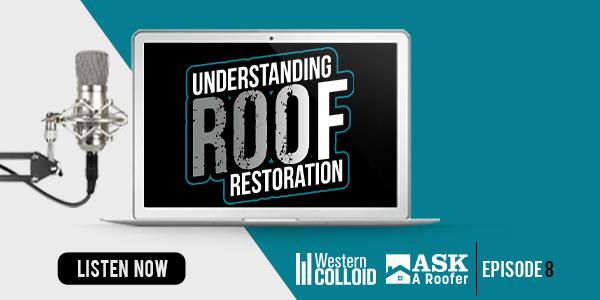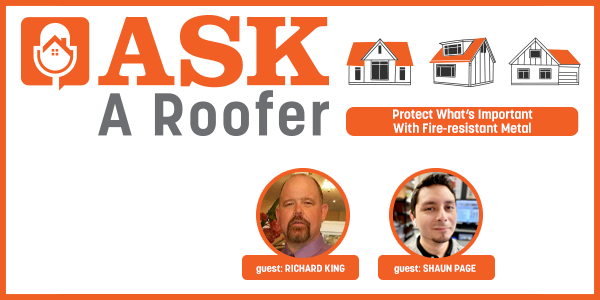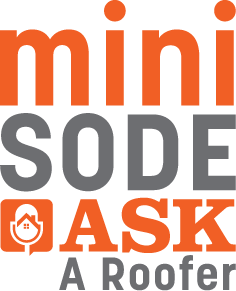Understanding Roof Restoration Episode 8 - Understanding FM & Other Approvals - PODCAST TRANSCRIPTION

Editor's note: The following is the transcript of a live interview with Western Colloid's Greg Hlavaty and Hal Leland. You can read the interview below, listen to the podcast, or watch the video.
Karen Edwards: Hello and welcome to the Understanding Roof Restoration Podcast. I'm your host, Karen Edwards, from askaroofer.com. The Understanding Roof Restoration Podcast dives deep into the topic of restoring roofs. As the popularity of roof restoration continues to grow, there are many questions that arise.
With a wide variety of roofing systems on existing buildings and many available restoration options, we turn to the experts at Western Colloid to answer your questions on roof restoration. Greg Hlavaty, Hal Leland and the team at Western Colloid have been manufacturing and installing these systems for more than 50 years, and they have seen it all. We will tackle a different topic each month and answer questions submitted by you, our listeners.
Hello and welcome back, everyone. I'm Karen Edwards, your host, and I'm really happy to welcome Greg Hlavaty and Hal Leland back to the show.
Hello.
Greg Hlavaty: Good to see you, Karen. Glad to be here.
Karen Edwards: Yeah. Today's topic, it's going to be really interesting because I think this is something that not a lot of people understand what it all means, and it's all about approvals. We're going to start with talking about what does it mean when a roofing system is FM approved, and what is FM?
Greg Hlavaty: In a big picture-type thing from 10,000 feet, one of the things that has been lacking or kind of overlooked in the roof coating industry and the maintenance industry of roofs has been some of the approvals, and that's because it's always been looked at as a bandaid. We'll do a repair. We'll put a coating on there. We'll make it last a little longer. What we tried to do in building maintenance systems was to go beyond that so that building owners and specifiers, instead of just thinking, oh, I got a bandaid coding I could put on, I got something with real teeth that has been tested, looked at, gone through the same rigorous testing that single-plies, modified bitumen, built-up roofs, you name it, goes through those same testing so that they have a comfort level that when we go out and talk to a building owner or specifier, architect or a consultant that they have some comfort that, hey, these are not just a five-gallon bucket and a guy with a roller. This can be done, and they write the same approvals you need to give your building owners comfort.
That's where this comes in. Where can you do this at? You can do it at FM. You can do it at a UL. You can have city and code approvals that start with ICC-ES. You can go to Dade County. There's a whole bunch of them. They're all important in their own own little world, and we'll talk a little bit more about that.
Karen Edwards: Let's start with FM. I mean, we're throwing out a lot of acronyms, and especially for a building owner who may not be familiar with it or somebody just getting started in the industry. Hal, I know you're very involved with FM. Can you tell me first of all what does FM stand for and what do they do?
Hal Leland: Okay. FM is Factory Mutual Global, and they're one of the largest insurance carriers in the world. I've gone over this before, but FM Global was founded in 1835. They're a 188-year-old company. That's ridiculous, right?
Karen Edwards: It is.
Hal Leland: We're a 50-year-old company. We've been putting these systems on successfully for over 50 years. 15 years ago, we started going to FM Global to get some testing on some assemblies. Polyester Reinforced - All Acrylic is where we started, and that was to compete with the largest manufacturers in the world. FM Global is a Fortune 500 company, which still means something in our crazy economy. They insure over $10 trillion worth of properties globally. That's in 130 countries. They're 6,000 employees worldwide. Their research campus in West Glocester is 1600 acres. They're a big deal.
To go through the trouble of getting an engineer, designing these assemblies, going out, building them, coming back 28 days later and doing the destructive testing and passing these assemblies, it says a lot about your company and the commitment to having that FM approvals mark on your product. If your product has an FM-approved mark, that means it's been through the certification testing process to verify its function as intended.
Karen Edwards: Okay, so it makes sense that an insurance company is not going to want to insure a building that has a roof that's not going to perform.
Hal Leland: That's correct. Yeah, it's the most sophisticated center for advancing the science of property loss prevention. That's what they're interested in. We have UL. We go to Underwriters Laboratories. We go to Miami-Dade. We tested ICC-ES, but FM is the gold mark.
Greg Hlavaty: One of the reasons FM has gone beyond their insurance capabilities, FM, because of the insurance and because nobody was testing roofs to their comfort level for all this insurance, they started doing testing many years ago, whenever that was. Hal knows more about that. Now, they're just looked at also just as a testing center. Whether you're insured by FM Global or not, the fact that you pass an FM standard is the gold standard. That means these guys have done the most, the longest, and now they've just become on there, besides the insurance portion of it, just the testing portion. It stands alone when necessary. You don't necessarily have to have an FM-insured building to have an FM-approved roofs.
Hal Leland: Yeah, in fact, that's maybe 75% of the projects we do. They're just looking for that FM diamond on the product. They're not insured by them. They're insured by someone else, but they know that they've done the work and that we've done the work to qualify for that FM diamond. It's a big deal.
Greg Hlavaty: Just because you do it once, if you did it, if we did a system back in 2010, it's like, oh, yeah, but what is it now? It doesn't just stop at that first test. We have inspectors at our plants for FM and UL and ICC-ES, but especially FM quarterly to make sure we're making the exact same products. They take tests of the products just make sure the formulas are the same so you get the comfort level also. Additionally, the products don't change. It's like, yeah, they made a good product back then, but what are they doing now? They bought a new additive and that. Everything is rigorously followed up on quarterly.
Hal Leland: Yeah, exactly right, Greg. That's followup-up services, right? FM has it. Underwriters Laboratories has it. Miami-Dade has it. They're sending agents in from their company twice a year physically and then quarterly remotely. You've got to be on your game. I mean, they're checking everything, certificates of analysis. They're checking all the raw materials. They're making sure that your titanium dioxide is up to snuff, that your acrylic resins are there, your biocides, your coalescing agents, your surfactants. They're checking everything, and they're checking formulations on every batch that we make. There can be hundreds of batches, and you have to be in line with what you've published with these groups. We're proud of it. It's a big deal, and we're not stopping. I mean, once you're in, you're in for life.
Karen Edwards: Yeah. It's an investment, an investment that you as a company are making into the product and into the performance of the product. That's ongoing, yeah.
Hal Leland: Well, it allows us to also get in front of all these consultants and architects and the specifiers and building owners throughout the United States and globally. Like I said, if you've got that FM diamond, they're happy to sit down in front of you and talk about your assembly, talk about their building, talk about what we may be able to do for them. Nine times out of 10, we've got a solution for them that's very cost-effective, that's sustainable, renewable and green.
Karen Edwards: Now, we mentioned UL, Underwriters Laboratory, and Miami-Dade. How are those different from FM? Will they provide testing, then FM will accept the results?
Hal Leland: UL will accept FM's results, and Miami-Dade will accept FM's results. My Bible that I carry in my office, it's based on the FM testing. ICC-ES will also follow FM testings, manufacturing process and certifications. It's all about FM. UL, the testing that we mostly do there is ASTM E108, which are burns, spread of flame from above. At FM, another note, Western Colloid, we have tested a couple of our assemblies at five and 12 to class A, which is ridiculous. Five and 12 is the highest pitch that they'll test ASTM E108 to, and Western Colloid has two class A assemblies for that. It's a pitch like this for 10 minutes at 1,650 degrees Fahrenheit, which is insane.
Karen Edwards: Wow. Yeah. Thank you for explaining that because we have all the acronyms and numbers. It's a bit hard to follow sometimes.
Greg Hlavaty: ICC-ES is a little different. ICC-ES is the International Code Council. They meet. They take ASTM standards. They take a lot of things into consideration, and they build a very lengthy, very in-depth book about a building and a structure. Roofing is only a small part of it, an important part, but a small part of it. They come up with all the input that gets put into what should be accepted for a flat roof, for what should be the minimum pitch, what materials are acceptable. There's all these things, and these are all input from members of ICC-ES and their board. They have ways of going about it.
If you want to be listed at ICC-ES, because what happens with ICC-ES is that most local municipalities, cities, municipalities, counties, states build their own building code, but they don't all write it themselves. Most of them go to ICC-ES, this huge book, and take pieces out of it to say, "Oh, the code for this is this, and we're going to use that and we're going to bring it into our code." That's kind of the starting place that ICC-ES got used to. A lot of people know what is ICBO. For years, it was called ICBO, the International Council of Building Officials.
That means where all the building officials got together, and so most of your local start with... They might take everything, but they take pieces of it. If you can get up there at ICC-ES and show them the right testing, FM is one of the things they'll do, UL, you can give them UL tests, you can give them different things, but FM is one of the most complete. You can take an assembly or a product, either an assembly system or a product, and get an ICC. Yep, you meet all the things we required in this type of a roof, whether it's a fluid applied roof, whether it's a modified bitumen or whatever, you meet these things, you can get an IC and then you pay to be listed up there. That's what. They're really a listing agency for you.
Hal Leland: These criterion Greg is talking about, these are ASTM and NC tests. ASTM is another huge part of this whole process, and we're deeply involved at ASTM. I'm a subcommittee chairman, D0809, which is that long title, but basically it's all coding of most chemistries for the world. My first engineer at FM Global, Dan Boardman, who is now vice president out at the research campus in charge of all the engineers, he's also D08 ASTM. I had dinner with him a couple of weeks ago in Denver. These ASTM tests are what everyone bases everything off of for everything that you have in your home just to cite to a-
Greg Hlavaty: Yeah, there's a test for your carpet and your rugs and the fiber in the carpet, and they're all based on either strength or the machines that are used to make them or the performance of them. ASTM, american Society for Testing Materials, I believe that is what it is. They say American, but it's really international.
Hal Leland: It's an international group for sure.
Greg Hlavaty: That's where all the basic tests come. Then you go to FM, and they'll use ASTM E108. They'll use ASTM test for elongation. They'll use ASTM, and they all build these different tests, and then, at the end, you want to get listed with a city or a state or something. You know you can go to ICC-ES or you can just go to your local government. Some states have listing agencies you usually pay. They don't do anything. You just give them all the work you've already done. You bring in your work that you've done the testing, and they give you a number, "Okay, you passed. This product has passed this for our system of acrylic roof coating," or whatever.
All these things cost money. Every step of the way, you're spending money, spending money spending, and it's not little bit. It's not tens of dollars. It's hundreds of thousands of dollars and millions for some of our big companies out there, and that's all to give the building owner a comfort level that, hey, these things are tested. There's a backbone there somewhere that is supporting this and keeping it in line and all that. We decided early on in the coding business to step up the game for us and become part of that system so we could become part of the specification route and comfort route, when I say comfort, building owner comfort, that they're getting what they're paying for, and it isn't just me saying, "Oh, this is great. We've used it for a long time. It'll work. Don't worry."
Karen Edwards: This podcast is brought to you by AskARoofer and Western Colloid Fluid Applied Roofing. When you're looking for answers for your roof, what better place than askaroofer.com? If you are looking for answers on restoring your commercial, industrial or low-slope roof, look no further than Western Colloid. For over 50 years, they have been bringing old roofs new life. Together, we're helping contractors, building owners, property managers, architects, engineers and consultants choose the best commercial roofing system. Find Western Colloid today on askaroofer.com.
What should a building owner know, because there's approval, but then there's rating, too? What is the difference, and what should they be looking for?
Greg Hlavaty: Well, usually, Hal can talk more about this. I'll say what I know about them. Usually, a approvals is usually a system. An approval just means that some places recognized what you make and it's approved for use in this city, state, that type of a building. There's all kinds of things that can go along. A rating can be more specific. Sometimes you'd get a rating just on a product. Sometimes you get a rating on things. Sometimes they're interchangeable, and they're just used in different ways.
Hal Leland: Yeah, they're just terms. I mean, I'm looking at a approval report from FM approvals, and it's approval testing of ElastaHyde roof coatings applied over class one built-up roof construction. It's a term, right? We have approvals for our assemblies, our specifications, our products.
Greg Hlavaty: And some things only go along with the product, and some things are attached to just a very specific specifications. That's where consultants come in, and architects. They do the deeper dive. A building owner generally doesn't do that. That was one of the important things about going to ICC-ES is that, when you go to a city, sometimes all the... An inspector in a city has a lot of things to look at in a building. You can go in different ways with all your backup. You can say, "Here's my UL." They say, "Okay. Well, that looks pretty good. You're tested at UL. You've done this and that. Okay, we're going to give you a stamp approved to put this roofing system on."
Some will do that, and that takes a little bit more work, but there's usually in the approval process, the permitting process, there's usually a box that used to say, "ICBO number." Now, it probably says, "ICC-ES." If you've got an ICC-ES number for that that they're using, he can just check the box, put the number in and he's done. They like that. It smooths the way to get in and out with city officials and other officials that are approving these things that have a lot of things to do and don't always have time to go through 40 pages of paperwork to get-
Hal Leland: Yeah, that's exactly right. Especially in the larger markets, Greg, like Los Angeles County, they don't have time. They want to know that you've spent the money to get that number, and that's a big deal to get that number. They can look that number up and verify it with ICC-ES, and they know that you've spent the money and the time and the testing and it saves them time. They know that they can trust you. Like I said, the larger markets, that's what they want.
Greg Hlavaty: But on the other hand, you can also go in with all your other testing because sometimes things don't fit. When you're doing maintenance systems like we are, renovations, roof renovations, you are oftentimes getting that roof that is different. It's had things put on it. It's had all kinds of changes made to the roof over the years by tenant improvements and what have you, and some things just don't fit. You can always go in with all your paperwork when you need to, and that's why we have the backup paperwork with FM and UL and all, and we can go to a city official, well, I know this doesn't meet any specific deal, but we have system. Look at the testing here. We want to give you a comfort level that what we're putting on and building on this roof as a renovation system, that it's going to perform even though it doesn't match your roof, doesn't match any criteria that's normally out there. It's been changed and altered and what have you.
Hal Leland: Right, Greg, like historic buildings, and a big thing is weight per square foot. We have all that data to make sure that the structure is going to support it.
Karen Edwards: Wow. That is a lot, so thank goodness for our consultants and experts in the area to help building owners navigate all of that. I was just curious of the role that RCMA, the Roof Coatings Manufacturers Association, plays in any of these codes and whatnot that's going on in the market. Could you talk about that a little bit?
Greg Hlavaty: They've been very helpful, but they're more of a watchdog in the marketplace. They don't really directly affect, but as a group, when the ASTM D6083 actually expired, which is the ASTM for acrylic roof coatings, which is the most widely used roof coating in the United States, that went away as ASTM because you have to renew these things. People have to come in and say, oh, yes, we're still using that. They want to keep it voted in at the ASTM level. That ASTM went away. Well, all of us as manufacturers at the RCMA weren't doing anything about it. Well, finally, a few active people in there said, look, this is going away. We need to do something about it. That's how Hal got involved in ASTM. We signed up as a company, and Hal became very active in there and became the subcommittee chairman for all roof coatings. We got that back in. We got it altered to a more modern, because some of these things were developed back in the '40s, '50s, '60s. Some of them need to be updated. There's new technology. That was one of them, so that was updated.
That all came about because the RCMA was looking at it and saying, hey, what's going on? Why is nobody participating? Some of our most important ASTM members are being retired. It's more of a watchdog thing. They look at, "Here's an important thing coming to ICC-ES. They're saying, you can't do this next year. You're going to have to do this next year. Do we want that done or do we want to go on the council and speak up and say look," so they get the group together of the roof coating manufacturers and speak up and sometimes guide testing and approvals and what have you and keep things going. That's their level, I think.
Karen Edwards: Okay. The other thing I wanted to ask about, Energy Star used to... Hal, you mentioned green and sustainability and cool roof systems. Energy Star used to give their mark of approval for roofs, but they retired that probably in the last year or two, and I believe the Cool Roof Rating Council now has stepped in as the authority on that. Can you talk a little bit about what the CRRC does and what that means?
Hal Leland: Well, the CRRC, the Cool Roof Rating Council, is a measuring company group. We test for reflectivity and emissivity, and we publish that. That's all we do, and I say, "We do," because I'm on the board of directors for the Cool Roof Rating Council. We were deeply involved with Energy Star as well, and we still work with Energy Star. In fact, our meeting two weeks ago in Las Vegas, we had representatives from the EPA there at our meeting. We're still talking with them, but they have in fact sunsetted the Energy Star program for roof coatings. They just didn't see the value in it currently. We're working on that with them. Every reflective material in the world is tested through the Cool Roof Rating Council for a certain reflectivity and emissivity, and it's particularly important in California because of Title 24. Title 24 in 2005 adopted reflective roofs. That's where Energy Star jumped on board with us. I've been working since the beginning with the Cool Roof Rating Council because that's what we do. I mean, we make reflective coatings, right?
Greg Hlavaty: We weren't asking them to do a lot of extra work, but they brought it on. They made it an important thing to building owners. They threw it out there, and then they deserted them. I think they did a very big disservice to the people of the United States by dumping that because they made that one of the main things to look at. "Oh, make sure you got an Energy Star roof." The Cool Roof Rating Council held the testing numbers. If you had them at the CRRC, you could get your Energy Star approval and put that Energy Star stamp on your products and all that, and then, all of a sudden, "Well, we've done our job with the roofing. That's over." Well, they've done their job with refrigerators, too, and they've done their job with air conditioners, too, but they keep going at it. To just dump it... because some people still look at it. They looked at it as an important thing. I think they've done a disservice to the building owners.
Hal Leland: They absolutely have. Our government in certain areas is very weak and fractured. At the time they dumped us, they were giving roof coatings for reflectivity and emissivity one point, but if you put a bike rack in front of your building, they gave you four points. I don't know. We went to Washington. I sat in there with a research chemist and one of our sales folks from the RCMA, and we met with the EPA, and we sat down with [inaudible 00:26:03] right before he was shooed out of office during the Obama administration. We've been working on it. We're continuing to work on it. We haven't given up on Energy Star. I mean, it's a great program, but it's being run by the federal government, which isn't always effective.
Karen Edwards: True. Well, I'm glad to see that they were at the CRRC meeting recently and that you guys are still working on it. Good stuff. All right. Wow. This has been a really great conversation. I think the main point with approvals and ratings is, as we said, it gives the building owner confidence in the quality of the product and the performance of the product, that it's going to do what we say the product is going to do. I know that the fluid applied roofing systems have, we've talked about this in other podcasts, decades and decades of proven performance, so building owners can be assured that, yes, it is going to work, it's going to perform, it's going to do what it's supposed to do.
I'd like to remind people that we want to answer questions on this podcast, so if you do have questions that you would like us to talk about, feel free to go to askaroofer.com. You can submit questions there. Go to westerncolloid.com. You can submit questions there. If we use your question, we will send you a gift, so that's always fun. This will be available to listen to on both of those websites, as well as any of your favorite podcast streaming platforms. Next month, we're going to be talking about metal roof restoration, so be sure to tune in.
Greg, Hal, thank you as always. Appreciate your wisdom.
Hal Leland: Okay. Thanks you.
Greg Hlavaty: Thanks, Karen.
Karen Edwards: See you next month.
Greg Hlavaty: Take care. Have a great 4th.
Karen Edwards: You, too.
Hal Leland: Take care.
Karen Edwards: Bye-bye.













Comments
Leave a Reply
Have an account? Login to leave a comment!
Sign In